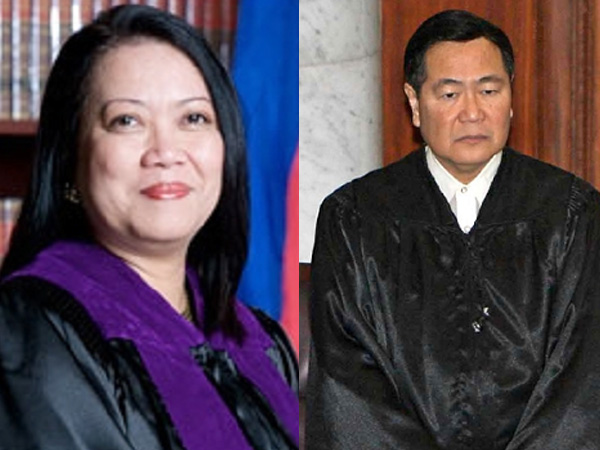
Chief Justice Maria Lourdes Sereno and Associate Justice Antonio Carpio. FILE PHOTO
Can an adopted child like Senator Grace Poe declare in legal documents that she was “born to” Ronald Allan Kelly Poe or Fernando Poe Jr. and Jesusa Sonora-Poe or Susan Roces?
Chief Justice Maria Lourdes Sereno and Senior Associate Justice Antonio Carpio have opposing views.
For Carpio, under the Dual Citizenship Law, an applicant is required to declare the names of his or her biological parents.
“If you mention a name that is not your biological father, that is a falsity and it is very material,” Carpio said.
Commission on Elections (Comelec) Commissioner Arthur Lim agreed with Carpio that such omission is considered misrepresentation.
“It is material representation which is false,” Lim said.
When asked by Carpio what is the effect of such misrepresentation on the legal documents of Poe, Lim said such documents, including the certificate of candidacy are “void ab initio” (void from the beginning).
Sereno, however asked “are you now saying she [Poe] cannot use the facts issued by the Civil Registrar itself?”
“Imagine she will be disabled under all grounds,” Sereno said pointing out that if Poe lies by indicating that her parents are Fernando Poe Jr. and Susan Roces “ she will have no claim whatsoever, no right whatsoever.”
Poe, a foundling was found abandoned in the church in Jaro, Iloilo in 1968. She was adopted by the celebrity couple. The adoption decree was issued in 1974.
The Comelec cancelled Poe’s certificate of candidacy on questions of her citizenship.
Petitioners including former Senator Francisco Tatad, former University of the East Dean Amado Valdez, Dr. Antonio Contreras said Poe cannot fulfill one of the basic qualifications to run for presidency which is being a natural born Filipino citizen because her parents were unknown.
Poe took the case to the Supreme Court, questioning the Comelec’s ruling.
Carpio also reiterated that before a foundling certificate is issued, a foundling, like Poe has to go through a process through the Department of Social Welfare and Development (DSWD). Undergoing a process, means the foundling, while considered a Filipino citizen is naturalized.
It was Carpio’s position that a natural born citizen need not go through a process before a citizenship is accorded to a person.
But Sereno said “foundlings do not perform an act to register themselves as foundling.”
However, Associate Justice Jose Perez has a different take on the matter.
He said the only thing that they are sure now is that the matter of the citizenship of a foundling remains undecided.
“It is an undecided proposition up to this moment,” Perez said.
“In other words, there is no truth to measure whether there was misrepresentation or not,” he added.
The high court has already terminated the oral argument and ordered the parties to simultaneously submit their memoranda by Monday.
After the submission of memoranda, the case is deemed submitted for resolution. TVJ
RELATED STORIES
Carpio, Sereno duel over Grace Poe in SC
Carpio urged to inhibit self in DQ cases against Poe